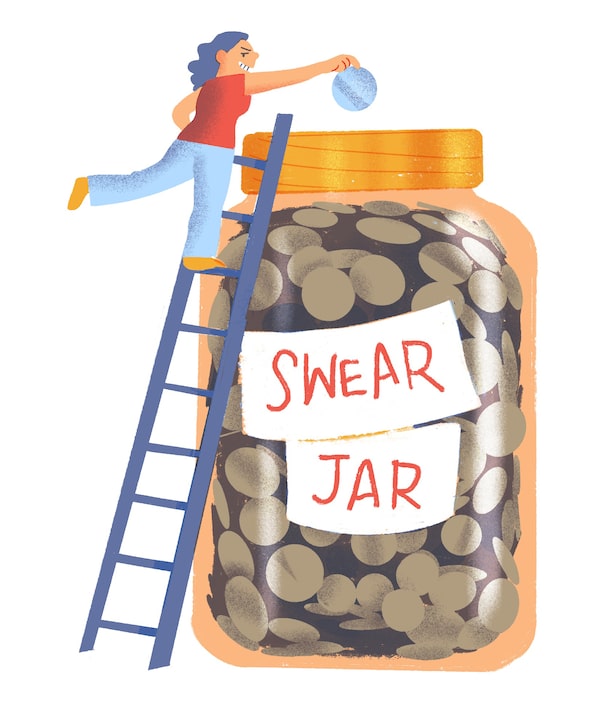TOP First Person is a daily personal piece submitted by readers. Have a story to tell? See our guidelines at tgam.ca/essayguide.

Illustration by Drew Shannon
“You used the F-word three times today!”
Chagrined, I was certain my profanity had offended the moral values of a fellow Zoom participant. So I monitored my language throughout the remainder of the call. Before signing off, I apologized for using that word. Imagine my relief when she replied, “It didn’t bother me. I’ve just never heard you say it before.”
She doesn’t really know me.
How did I become a woman who chooses to pepper her everyday speech with such an obscene word? And it is a choice because I don’t stoop to saying it in certain company or around children.
My dad never swore and my mother was a gentle, soft-spoken woman who sought to please others. Mind you, she endured years of acquiescing to her mother-in-law’s criticism and demands. Now and then, her anger and frustration erupted into a string of five words. As a child, I never repeated those words although in a fit of pique directed at my older sister, I wrote them in pencil on her bedroom window frame: “dam, debil, hell …” along with two “b” words, both of which I misspelled. My 85-year-old sister still remembers.
In my late 20s, I married a man who only invoked the F-word in traffic jams. In rapid succession, we produced three children whose language began to gravitate toward the gutter in their teenage years. To achieve a modicum of civility, we introduced a swear jar. Negotiations ensued to determine the list of forbidden words. Dam, debil and hell didn’t make the list, although the “b” words did. George Carlin’s Seven Words You Can Never Say on Television were also deemed illicit. The fine for uttering each profane word was 25-cents. Clink, clink, clink, as coins ricocheted into the empty Mason jar. Ka‑thunk, as the jar filled up. I should know. I was the worst offender.
My current predisposition to such language has been reinforced, if not magnified, by streaming services. Carlin’s filthy words are sprinkled throughout online offerings, especially in performances starring stand-up comedians. Perhaps my vulgar vernacular has been most influenced by comedy and political podcasts. I’m addicted to bro‑talking podcasters who drop the F-word, not for shock value or emphasis, but because they can. Smartless, my favourite, stars Jason Bateman, Sean Hayes and Will Arnett. Every Monday morning, I am thrilled when new episodes arrive and I chortle to myself while eating breakfast. At times, when my solitary existence demands an uplifting boost, I replay a previous program. Today, it was their one-hour interview with Stephen Colbert. The F-word or derivatives thereof were spoken 26 times! Yes, I counted.
Netflix has capitalized on society’s fascination with the profane by airing the History of Swear Words hosted by Nicolas Cage. Each of six episodes focuses on a notorious English swear word and viewers receive lectures from lexicographers, language scientists and comedians. In the first minute of the first episode, Cage used variations of the F-word 15 times. Even to me, it was excessive and seemed to target an adolescent audience.
Academic linguist John McWhorter in his recent bestselling book, Nine Nasty Words: English in the Gutter ‑ Then, Now, and Forever, makes the case that dropping an f‑bomb lights up the right side of the brain, setting profanities apart from ordinary words that reside in the fairly logical left brain. He suggests the urgency with which we say that word is related to the fight or flight response.
Research by psychologists at Keele University in Britain reveals that swearing increases pain tolerance. In an experiment in which participants immersed their hands in ice-cold water, the cursing crowd kept their hands in the frigid water significantly longer than non-swearers who repeated a neutral word, such as wood.
However, these findings do not explain why I resort to taboo words when I spill my coffee or forget why I’ve gone upstairs. I believe I say them because I can.
My stern God-fearing grandmother, raised in the Victorian era, would certainly have exclaimed “Oh pshaw!” if she had known about my predilection for profanity. If she were still alive, I suspect she would wash out my potty mouth with soap. In Victorian times, women as angels of the hearth were guardians of respectability and morality. A woman who uttered a blasphemous or obscene word violated social norms and was labelled unladylike. Even in today’s liberal-minded cultural milieu, some people might label my use of dirty words as unladylike. Guilty as charged! After all, why should men be the only ones allowed to swear like a sailor?
As an adult, who is decades beyond the age of majority, I resent having naughty words bleeped out of YouTube videos and streaming services. Recently, I’ve been watching Arrested Development and was perturbed to discover that colourful language has been exorcised. Really? On Netflix? Suffice to say, my murky mind has become adept at substituting the forbidden words. What really riles me, however, is Apple’s profanity filter. It’s ducking annoying when their autocorrect replaces words in my text messages.
Gina Clark lives in Toronto.
Sign up for the weekly Parenting & Relationships newsletter for news and advice to help you be a better parent, partner, friend, family member or colleague.